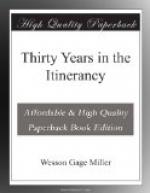The Report adopted by the Conference on the state of the country gave no uncertain expression of sentiment. Assuming the position dictated by the most lofty patriotism, she pledged the country an unwavering support until the flag of the Commonwealth should again wave in peaceful triumph over the entire land. Recognizing human freedom as the issue in the conflict, she deemed it alike the duty of the citizen and the Christian to prosecute the war.
At this Conference the death of Rev. Jonathan M. Snow was announced, and his obituary placed upon the Minutes. Brother Snow, after spending a short time in Racine, entered the Illinois Conference in 1838. His appointments were Elgin, Princeton, Mount Morris, Geneva, Washington, Sylvania, Troy, Janesville, Mineral Point and Madison. At the close of his labors at Madison, in 1852, he retired from the active work, but in 1859, he was re-admitted and granted a superannuated relation. Brother Snow was a decisive man, earnest, energetic and persevering. He performed his full share of pioneer work, and deserves an honorable mention among the Fathers of the Conference,
In compliance with the request of the Spring Street Station, Milwaukee, I was this year appointed to its Pastorate, my term on the District having expired. At the earliest possible moment, I entered upon the work of my new field. But at the opening of the year we were called to pass under a cloud. I refer to the death of Dr. Bowman, the father of Mrs. Miller. The Doctor had been compelled, through illness, to surrender his practice in Iowa, and had now been with us three years. His death was peaceful, and his assurance triumphant.
Dr. Bowman came to Wisconsin in 1840, residing, as we have seen, first at Troy, and subsequently at Waupun. In early life he was a skeptic, and continued in unbelief, until after his elevation to a Judgeship in Michigan. He was converted through the influence of his wife, and united with the Methodist Episcopal Church. Distinguished in his profession, reliable in his religious convictions, and devoted to the Church, he was an arm of strength to the cause in its early struggles in the West.
During the interval since my former Pastorate in 1851 and the present, various changes had occurred at Spring Street. The Society had lost two Churches by fire, and Summerfield charge had been formed. The successive Pastors had been Revs. S.C. Thomas, Chauncey Hobart, P.S. Bennett, Milton Rowley, C.S. Macreading, E. Robinson, J.M. Walker, and J.C. Robbins. To several of them reference has been made in former chapters. We will now refer to others.
Rev. P.S. Bennett entered the Black River Conference in 1838, and remained a member of that body until 1849, when he was transferred to the Wisconsin Conference. Among the several charges he filled in his old Conference, were Norfolk, Bangor, Brownville, Salina, Cleveland, Van Buren and Red Creek. In Wisconsin he had been stationed at Platteville, Beloit, and Waukesha.




